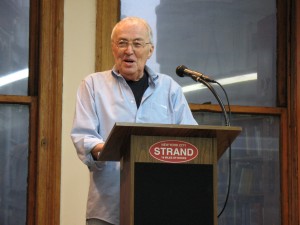
The late novelist David Markson gives a reading at the Strand bookstore in 2007. His personal library was sold to the Strand after his death. An Internet sensation ensued. (Image by Sleepyrobot.)
David Markson, the stubbornly inventive novelist who wrote the brilliant and challenging book, Wittgenstein’s Mistress, sadly passed away in June of this year. Eulogies were written by friends and admirers, but as can happen in our contemporary media landscape where everyone is seemingly connected, Markson has quickly had an unusual posthumous second act.
Markson’s personal library of 2,500 books was sold to the Strand bookstore in Manhattan, where they are being sold separately to individual customers. But one shopper noticed the name “David Markson” written inside the cover of a copy of Don DeLillo’s White Noise (also a great novel) and researched him. When she subsequently put his amusing notes from inside the book online, it mobilized an online community of book lovers who descended on the Strand to try to snare and share Markson’s other books and notes. Craig Fehrman of Boston.com provides the story:
“A few weeks ago, Annecy Liddell was flipping through a used copy of Don DeLillo’s White Noise when she saw that the previous owner had written his name inside the cover: David Markson. Liddell bought the novel anyway and, when she got home, looked the name up on Wikipedia.
Markson, she discovered, was an important novelist himself–an experimental writer with a cult following in the literary world. David Foster Wallace considered Markson’s Wittgenstein’s Mistress–a novel that had been rejected by 54 publishers–‘pretty much the high point of experimental fiction in this country.’ When it turned out that Markson had written notes throughout Liddell’s copy of White Noise, she posted a Facebook update about her find. ”i wanted to call him up and tell him his notes are funny, but then i realized he DIED A MONTH AGO. bummer.”
The news of Liddell’s discovery quickly spread through Facebook and Twitter’s literary districts, and Markson’s fans realized that his personal library, about 2,500 books in all, had been sold off and was now anonymously scattered throughout The Strand, the vast Manhattan bookstore where Liddell had bought her book. And that’s when something remarkable happened: Markson’s fans began trying to reassemble his books. They used the Internet to coordinate trips to The Strand, to compile a list of their purchases, to swap scanned images of his notes, and to share tips. (The easiest way to spot a Markson book, they found, was to look for the high-quality hardcovers.) Markson’s fans told stories about watching strangers buy his books without understanding their origin, even after Strand clerks pointed out Markson’s signature. They also started asking questions, each one a variation on this: How could the books of one of this generation’s most interesting novelists end up on a bookstore’s dollar clearance carts?”
Tags: Annecy Liddell, Craig Fehrman, David Markson
